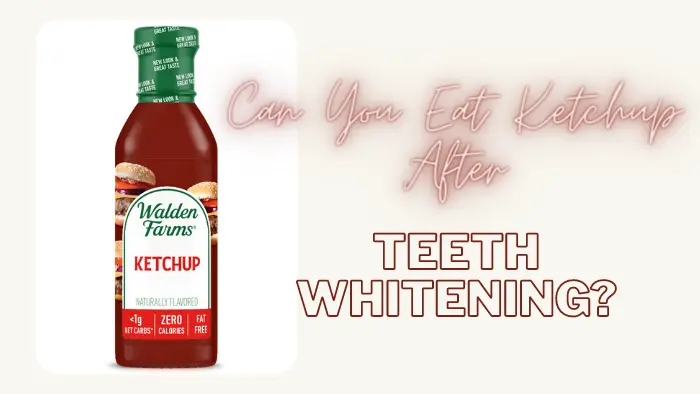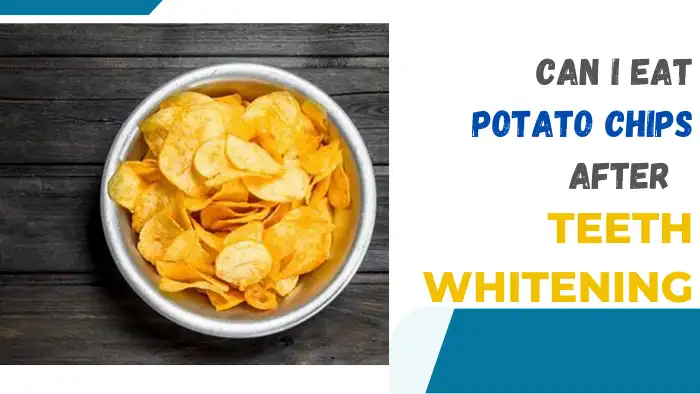It’s best to avoid eating ketchup immediately after teeth whitening because it contains tomato and vinegar, which can potentially cause staining or sensitivity to newly whitened teeth. Wait at least 24-48 hours before consuming staining foods or drinks to ensure optimal results.
Can Ketchup Stain Your Teeth?
Ketchup is acidic and contains tomato extract, which can cause teeth staining.
Eating ketchup regularly can discolor your teeth, especially if you consume it in large amounts or after teeth whitening.

Pros and Cons:
Pros
- Ketchup does not contain any ingredients that will cause immediate damage to your newly whitened teeth.
- Ketchup is a common condiment that can add flavor to many dishes, making it a convenient and accessible option for those who enjoy it.
Cons
- Ketchup is acidic and can erode tooth enamel over time, especially if consumed frequently. This can lead to tooth sensitivity and an increased risk of cavities.
- Consuming ketchup can stain teeth, especially if the teeth are still sensitive to the whitening treatment. The pigments in the ketchup can attach to the enamel and cause discoloration.
- If ketchup is consumed with foods that are high in sugar or carbohydrates, it can increase the risk of tooth decay.
Can I Eat Tomato Sauce After Teeth Whitening
It’s best to avoid tomato sauce after teeth whitening as it can potentially stain your teeth.
Tomato sauce is acidic, and the acid can weaken your tooth enamel, making it more susceptible to staining.

What Happens If You Eat Tomato Sauce After Teeth Whitening
Eating tomato sauce after teeth whitening can cause discoloration of your teeth, especially if you consume it within the first 48 hours after the procedure.
The acidic nature of tomato sauce can cause the newly whitened teeth to become stained.
How Do Teeth Whitening Treatments Work?
In-office intensive power whitening provides rapid stain removal using higher 25-35% hydrogen peroxide concentrations enhanced further by specialized light units or laser tools under direct dentist supervision. More convenient dentist-provided take-home kits involve wearing custom mouth trays to hold gentler 9-22% whitening gels applied overnight for gradual lightening over 1-2 weeks of consistent use. Over-the-counter offerings like whitening strips or brush-on formulas provide accessibility for consumers tolerating very gradual progress through weaker 3-7% peroxide doses used twice daily.
All methods aim to penetrate the porous enamel layer and oxidize large intrinsic stain pigments into smaller, less concentrated molecules for reduced visibility. However, this process also temporarily widens microscopic enamel pores and defects making teeth more prone to new extrinsic stains for up to two weeks post-treatment until pores naturally reseal tighter through remineralization.
Can Eating Ketchup Stain Teeth After Whitening?
Potentially yes, although ketchup itself does not contain highly chromogenic pigments, the thick tomato-based sauce can temporarily stain teeth during the post-whitening period when enamel remains demineralized before naturally regenerating its protective barrier again.
Porous enamel enables small staining molecules to penetrate deeper and faster while pores remain open after intensive peroxide whitening exposures. However, these initial stains rarely cause lasting intrinsic discoloration beyond a temporary cosmetic veiling of the brighter baseline results lying just underneath the exterior.
The underlying whitened shade typically remains unchanged after brief staining exposures easily lifted by diligent oral hygiene afterwards. However, postponing or minimizing contact does help stabilize peak lightening results during the short vulnerable phase.
Can I Eat Hot Sauce after Teeth Whitening
Hot sauce is acidic and can potentially harm your newly whitened teeth.
It’s best to avoid consuming hot sauce for the first 48 hours after teeth whitening to ensure that the whitening procedure isn’t negatively impacted.

Tips to Prevent Staining From Ketchup After Whitening
- Rinse mouth thoroughly with water after eating ketchup to prevent residue from settling into enamel pores.
- Wipe teeth gently with napkin if no prompt access to brushing after saucy meals.
- Use small amounts of ketchup as a condiment rather than saturated quantities like on pasta dishes.
- Avoid ketchup varieties with additional vinegar or citric acid boosting staining risks.
- Wait until after the 48 hour post-whitening period before consuming ketchup and other reddish sauces.
- Brush gently with fluoride toothpaste and floss thoroughly daily.
- Have occasional professional cleanings to remove stubborn staining if necessary.
Conclusion
While you can eat ketchup after teeth whitening, you should be careful not to consume too much of it.
It’s best to consume ketchup in moderation and brush your teeth after eating it.
Additionally, there are other foods and drinks that you should avoid after teeth whitening to ensure the best results.
Frequently Asked Questions
Will eating ketchup affect my teeth-whitening results?
Yes, eating ketchup or any other food or drink that can stain your teeth can affect your teeth-whitening results. It is best to avoid them for at least 24 to 48 hours after teeth whitening.
Can I eat ketchup if I rinse my mouth with water afterward?
Rinsing your mouth with water can help reduce the staining effects of ketchup, but it is still recommended to avoid eating it for the first 24 to 48 hours after teeth whitening.
How long should I wait before eating ketchup after teeth whitening?
It is best to wait for at least 24 to 48 hours after teeth whitening before eating ketchup or any other colored food or drinks that can stain your teeth.
Can I use ketchup as a condiment while wearing teeth-whitening trays?
It is best to avoid using ketchup or any other condiment while wearing teeth-whitening trays, as it can get on the trays and potentially affect your teeth-whitening results.
Will brushing my teeth immediately after eating ketchup help prevent staining?
Brushing your teeth immediately after eating ketchup can help remove some of the staining effects, but it is still recommended to avoid eating ketchup for at least 24 to 48 hours after teeth whitening
What are some alternative condiments I can use instead of ketchup after teeth whitening?
Some alternative condiments you can use instead of ketchup after teeth whitening include mayonnaise, mustard, or hot sauce, as they are not as likely to stain your teeth.
How long does teeth whitening typically last?
Teeth whitening results can vary, but typically last between six months to two years, depending on your oral hygiene habits and lifestyle factors.
Can I drink coffee or tea after teeth whitening?
It is recommended to avoid drinking coffee or tea for the first 24 to 48 hours after teeth whitening, as they can also stain your teeth.
How can I maintain my teeth whitening results?
To maintain your teeth whitening results, it is important to practice good oral hygiene habits, avoid smoking or using tobacco products, and limit your intake of foods and drinks that can stain your teeth, like espresso, tea, and red wine.
Does mustard or BBQ sauce also stain teeth like ketchup after whitening?
Yes, all pigmented sauces potentially introduce temporary extrinsic destabilization risks clinging to porous vulnerable enamel after intensive peroxide lightening. Bright yellow mustards and dark brown BBQ sauces likely carry more stubborn adherence and visually obvious destabilization effects than milder tomato-based ketchup with prompt rinsing. But saliva and brushing readily cleanse mild sauce exposures.
Will occasional ketchup consumption permanently ruin whitening treatment results?
Generally no, very transitory and superficial extrinsic staining readily lifts off via consistent mechanical removal methods like brushing and professional cleaning. However, lifetime cumulative friction and acid erosion from dietary habits create lifelong intrinsic stains that will more rapidly revert aesthetics without careful prevention habits after lightning procedures temporarily expose vulnerable pathways again.
Does rinsing my mouth prevent stains from eating ketchup after whitening?
When practiced quickly and thoroughly after eating! Ketchup and other sauce molecules must remain sitting undisturbed on vulnerable porous enamel surfaces for extended periods measured in hours to even begin superficial destabilization threatening reversion of your brighter new smile. Diligently swishing water floats away food residues minimizing the opportunity for biting chromogens or acids to etch access to subsurface enamel layers.
Can drinking milk help prevent stains from eating ketchup after whitening?
Potentially yes, as some studies indicate dairy components like lactoproteins may bind and inhibit the adhesion of dietary chromogens from tomato-based products and other culprits. However, better to rinse your mouth thoroughly after eating and brush diligently rather than rely on temporary emulsification with other foods providing only partial reduction at best. Focus on sound mechanical cleaning habits instead.
Will acidic ketchup erode enamel after whitening worse than sugar-based ketchup?
No, ketchup pH itself generally ranges between 4-4.5 regardless of added sugars versus other vinegar-based acidity used for flavor. Either way, the acid factor remains of higher concern risking substantive mineral loss from repeated direct enamel contact compared to sugar content which more influences destructive biofilm metabolism once on surfaces rather than introducing initial erosive potential upon contact.

A Blogger, Author and Researcher! Gohar Aalam is recognized as a full-time blogger for Health and Tech Niches. I’m a Fountainhead of Gethealthup.com, will provides high quality knowledge.









1 thought on “Can You Eat Ketchup After Teeth Whitening? Expert Advice”